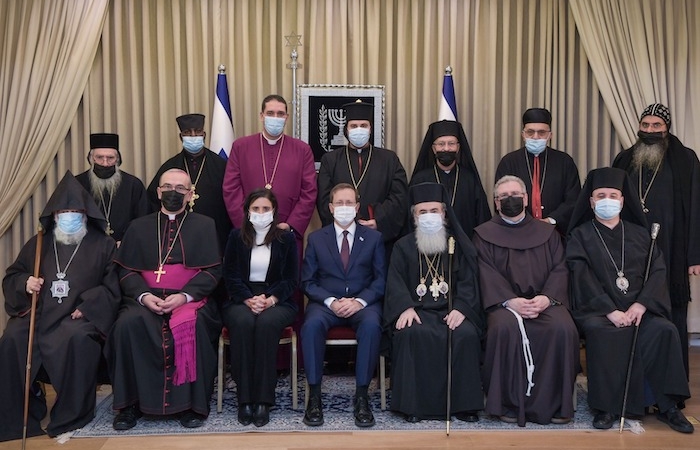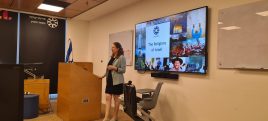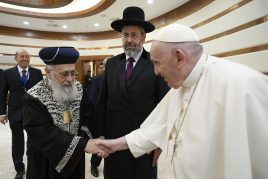
Tania Berg-Rafaeli, director of the Department for World Religions at the Ministry of Foreign Affairs of Israel, describes to SIR the tasks and objectives of the Department she chairs. “Any religious-related issue is of great significance for Israel, with implications on the international stage. Promoting interfaith tolerance, freedom of worship and coexistence and cooperation among nations is among the goals of the Department I chair, which operates within the Ministry of Foreign Affairs. We pursue our activities in cooperation with the other Ministries in the awareness that fostering relations with different faiths and Churches implies cultivating relationships with other countries, as in the case of the Catholic Church here in Israel, which is part of the Holy See, or the Russian, Greek, Coptic or Armenian Orthodox Church, which refer to their respective countries.”
 The diplomat is currently in Italy where she participated in the meeting The Church Up Close (VIII Edition) on the theme: “Covering Catholicism in the Age of Francis” promoted by the Pontifical University of the Holy Cross. The event was designed to provide journalists and communicators with the tools to improve professional coverage of the Roman Catholic Church and the Vatican.
The diplomat is currently in Italy where she participated in the meeting The Church Up Close (VIII Edition) on the theme: “Covering Catholicism in the Age of Francis” promoted by the Pontifical University of the Holy Cross. The event was designed to provide journalists and communicators with the tools to improve professional coverage of the Roman Catholic Church and the Vatican.
The contribution of religions. “Nurturing relationships with one or more countries, which may concern more or less complex topics, requires sensitivity and an international approach,” says Berg-Rafaeli. “Meeting with religious delegations from other countries, attending various meetings on the themes of dialogue and religious freedom, visiting the representatives of different faiths, as well as simplifying entry visas, are all ways of achieving our goals.” Including the organisation of events: “A Conference on religions and climate change is being planned by my Department for the beginning of November, in accordance with the Pope’s agenda enshrined in Laudato Si’. It will bring together rabbis and various religious leaders. Indeed, it is important to acknowledge that religions form part of the entire world, hence the importance for religious leaders to contribute to such topical and urgent issues. They have a special voice within their respective communities.” A delegation from Israel, made up of members of different faiths, travelled to Dubai last year. “In the wake of the Abraham Accords, signed in August 2020 by Israel, the United Arab Emirates (UAE) and the United States,” the diplomat recalls, “we highlighted the need to promote tolerance and mutual understanding. Establishing closer relations with countries in the Arab world, such as the United Arab Emirates, offers many opportunities for dialogue, with undeniable positive repercussions within our States – such as student and academic exchange programs.”
 Countering radicalization. “Tolerance and dialogue are key to countering all forms of fundamentalism and religious radicalism,” Berg-Rafaeli pointed out, “as reaffirmed in the Final Declaration of the inter-religious meeting in Kazakhstan attended by 100 delegations from 50 countries.” Pope Francis, the two Chief Rabbis of Israel – Ashkenazi Rabbi David Lau and Sephardi Rabbi Yitzhak Yosef – the Grand Imam of Al-Azhar Ahmed El-Tayyeb, the Greek-Orthodox Patriarch of Jerusalem Theophilos III attended the event along with many other religious leaders. “We held a similar meeting in Israel past March in Haifa, in the Bahá’í Gardens, whose faith community testifies to Israel’s religious diversity. In that context, we discussed the role of religions to counter violence, and we highlighted the growing importance of dialogue and encounter”. For the Israeli diplomat, “the recognition of human dignity for all, regardless of religious, ethnic or social affiliation, remains indispensable. It constitutes the cornerstone of all things. Talking about human dignity implies promoting freedom of religion, which is one of the objectives of the Department I head: freedom of worship and access to the holy places are all principles that we find in our Declaration of Independence and that guide our actions in this area. In fact, Israel is home to numerous holy sites, pilgrimage destination for believers of different faiths, Christians in particular.” In this respect, Berg-Rafaeli concludes, “we have very good relations with the local Catholic Church. I go to the Old City of Jerusalem every week to visit and learn more about the different Christian Churches that operate there, offering our support for whichever need or necessity may arise.”
Countering radicalization. “Tolerance and dialogue are key to countering all forms of fundamentalism and religious radicalism,” Berg-Rafaeli pointed out, “as reaffirmed in the Final Declaration of the inter-religious meeting in Kazakhstan attended by 100 delegations from 50 countries.” Pope Francis, the two Chief Rabbis of Israel – Ashkenazi Rabbi David Lau and Sephardi Rabbi Yitzhak Yosef – the Grand Imam of Al-Azhar Ahmed El-Tayyeb, the Greek-Orthodox Patriarch of Jerusalem Theophilos III attended the event along with many other religious leaders. “We held a similar meeting in Israel past March in Haifa, in the Bahá’í Gardens, whose faith community testifies to Israel’s religious diversity. In that context, we discussed the role of religions to counter violence, and we highlighted the growing importance of dialogue and encounter”. For the Israeli diplomat, “the recognition of human dignity for all, regardless of religious, ethnic or social affiliation, remains indispensable. It constitutes the cornerstone of all things. Talking about human dignity implies promoting freedom of religion, which is one of the objectives of the Department I head: freedom of worship and access to the holy places are all principles that we find in our Declaration of Independence and that guide our actions in this area. In fact, Israel is home to numerous holy sites, pilgrimage destination for believers of different faiths, Christians in particular.” In this respect, Berg-Rafaeli concludes, “we have very good relations with the local Catholic Church. I go to the Old City of Jerusalem every week to visit and learn more about the different Christian Churches that operate there, offering our support for whichever need or necessity may arise.”









